#frankenquotes
Text
A BEATLE DIDN’T SAY THAT! Lewisohn’s lab-created quotes
“One of the things about this book that is a strength is it’s not me saying anything, it’s them or other people. I shape the text, I plot where it goes, I weave it, but the quotes are theirs. And so when I’ve got Paul McCartney behaving in a way some readers might think, ‘Whatever, oh dear,’ it’s actually him saying it. So you end up thinking that to his own credit he said that. It’s not me saying it.” (Mark Lewisohn, ‘Noted,’ (October 7, 2013) Somerset, Guy.)
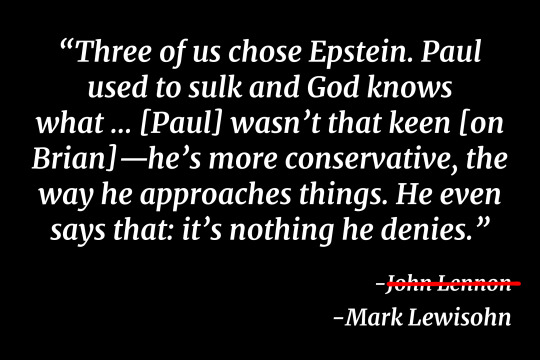
This is hella long, and that's because it's actually a full blog post. (In case you want it in a less monstrous form.)
A lot of people for a long time have put a lot of trust in Mark Lewisohn’s footnotes. Or at least in the fact of those footnotes. Because once you dig through them for any length of time you quickly discover that Mark Lewisohn’s footnotes hold secrets that would get him expelled from any undergraduate program. They reveal a “history” often contrived through a mass of Frankenquotes, ala carte creations, Lewisohn rephrased ‘paraphrases,’ and worse. For some parts of the narrative things aren’t too bad, yet in others monsters lurk around every corner. But this is not the sort of thing that’s graded on a curve, and it is past time to have a conversation about what standards should be accepted in Beatles’ scholarship.
Lewisohn lists his sources unlike most others. And his footnotes alone are more insightful than some other writers’ books. (Reddit, r/beatles)
I do not judge footnotes based on their insightfulness, nor do I want to single out a redditor, but I grabbed the comment because it’s an opinion that is widely shared and even accepted as canon. At least by people who have not combed those freakish footnotes. And while the pages of piled up sources do look fearsome en masse, a closer inspection reveals an offense to the truth, a threat to the record, and a blight on Beatles’ historiography.
“The rules for writing history are obvious. Who does not perceive that its chief law is never to dare say anything false, and never dare withhold anything true? The slightest suspicion of hatred or favor must be avoided. That such should be the foundations is known to all; the materials with which the building will be raised consist of facts and words.” –Cicero
A Look at Lewisohn’s Lab-created Frankenquotes
FIRST, WHAT ARE QUOTES? AND WHY ARE QUOTES?
Quotes are the soul and center of recorded—and recording— history.
And the rules around quotes and quotation marks are pretty simple. Most people, even if they’ve never written anything beyond a term paper, understand what quotation marks represent.
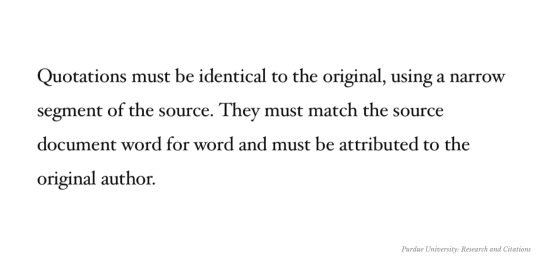
A set of quotation marks means, “This person said or wrote ‘these exact words’ at some given time.” You can smash a quote from two hours before or two years before right up against a separate quote to make your point—although it might get your grade lowered—but what you cannot do is take two different statements from two different times and make them seem like they are one statement.
When you put words inside one set of quotation marks you are stating, in black and white, that the identified person made this statement. That they said all those words together—or if you want to excise a reasonable part and use ellipses to represent that— as part of the same statement.
Look, combining two separate quotes that are not part of the same thought or topic is not a subjective issue. It is not an issue of controversy. Quotes are the bone marrow of written history. Quotes are the alpha and omega. In academic work or journalism they have to be, which makes sense as soon as you think about it. If it was cool for me to take a transcript and grab half a sentence from page 2 and half a sentence from page 17, push them together as if those words were spoken one after the other in a single thought, I bet I can manage to get those words to say almost anything I want.
Separate thoughts must be in two separate quotation marks. Separate. Somewhere between four sentences and a paragraph is widely accepted as the “two separate quotes” line, and there can be some ethical and technical wiggle room in a long rant by a person, but what makes all that subjective nonsense go out the window is if the quotes come from two separate questions. Or two separate days. That’s two quotes. Not hard.

Which again, makes sense if the point is conveying information to the reader and lessening the chance of a writer manipulating someone else’s words to express something that the person didn’t mean.
This is the contract inherent in a quote. These are the rules we all agree to and understand, and these are the reasons why. And there’s no reason to break them.
Why do you want me to believe that John said these two things at one time? What was wrong with what he did say?
THE FOUR MOST COMMON WAYS MARK LEWISOHN MAULS THE MEANING OF THE QUOTE:
The Basic Lewisohn Frankenquote 🧟♂️
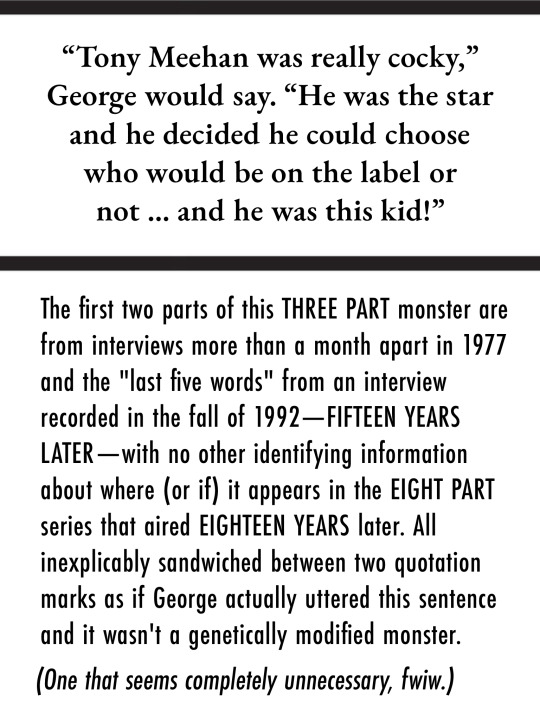
(“CONCLUDING FIVE WORDS FROM—” – I cannot even see the point of this THREE PART monster. Full footnote reads: 9) Author interview with Tony Meehan, September 6, 1995. (“I met George again in 1968 and for some reason he was harboring a grudge against me. He was very, very uptight about it—’You blocked us getting a recording contract …’ ”) First part of George quote from interview by Terry David Mulligan, The Great Canadian Gold Rush, CBC radio, May 30 and June 6, 1977; concluding five words from interview for The Beatles Anthology)
This three-headed monster attributed to George Harrison is a very dull little guy. Not particularly venomous. Just convenient, I guess. For whatever reason, Mark Lewisohn decided it was worth rummaging through the quote buffet until he collected enough pieces for George Harrison to say this thing. “…concluding five words from…” What are we even doing here? No, really. Please tell me.
And like a lot of the footnotes for these bespoke quotations, there are further problems. “[F]rom interview for Beatles Anthology”? An interview that aired? In one of the episodes? Can you narrow it down? I guess I’ll just have to listen very closely to them all and hope I don’t miss the five words.
But if we got bogged down in the sorts of trivial details that would immediately lose a college student a letter grade off a History 101 paper we would never get anywhere. We have to stick to the violent felonies.
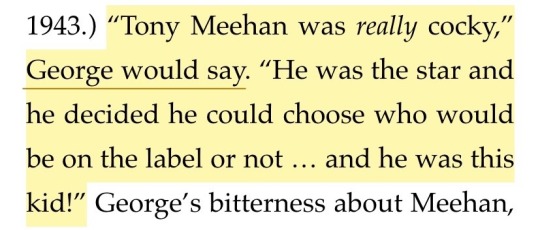
*Love the "George would say——" Uh, would he? Well, I guess after all that trouble you went to, he would now. It's really incredible how cavalier Lewisohn is about a Beatle's words.
These sorts of reconstituted, lab-engineered, made up “quotes” are shot throughout Tune In. “Quotes” made up of words from two, three, and even four sources, spoken months or often years apart.
Ala Carte Creations 🍱
It really is a buffet, and these ala carte creations come in all shapes and sizes. They might just be words that have been plucked up and glued back together to make something more useful to a particular narrative. (Ellipses or dash optional.)
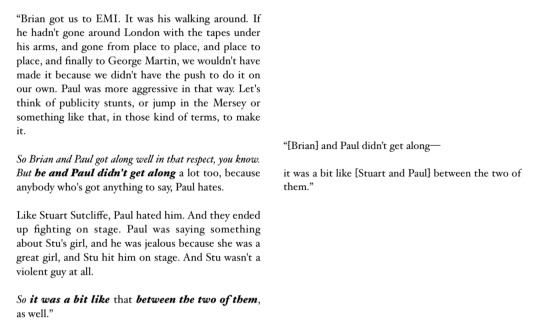
TUNE IN: “John saw a bigger picture, and it would be surprising if it wasn’t equally obvious, or made obvious, to Brian and George. He likened Paul’s enduring snag with Brian to his other long-standing difficulty: ‘[Brian] and Paul didn’t get along—it was a bit like [Stuart and Paul] between the two of them.’” (Footnote 37: Interview by Peter McCabe and Robert D. Schonfeld, September 1971)
Bonus 🍒 Phoebe's dramatic reading of John's original quote:
The Donut 🍩
Then there are a seemingly uncountable number of “quotes” with a sentence or three ripped out from the middle, but with zero representation that more words were ever there. (And in most of these particular deceptions, the simple representation of something excised (. . .) would make the quote fine. There are a lot of these, but they are also the easiest to fix.)

Chapter 10: “I was in a sort of blind rage for two years. [I was e]ither drunk or fighting. **It had been the same with other girlfriends I’d had.** There was something the matter with me.”
And then there are the true buffet bonanzas, words lifted and twisted beyond recognition until they say something brand spanking new.
However, John remembered Paul’s attitude to Brian being very different. John was always emphatic that Paul didn’t want Brian as the Beatles’ manager and presented obstacles to destabilize him, to make his job difficult … like turning up late for meetings. “Three of us chose Epstein. Paul used to sulk and God knows what … [Paul] wasn’t that keen [on Brian]—he’s more conservative, the way he approaches things. He even says that: it’s nothing he denies.”
The Lewisohn Remixes 🍸
And then there are the “paraphrases.” I couldn’t even begin to guess how many of these there are, and often they aren’t even paraphrases, but whole new Mark Lewisohn re-interpretations with quotation marks slapped around them. But if you don’t check, you probably won’t know, because like this Lewisohn rewrite of a well-known Mrs. Harrison quote, there’s a good chance you’ll recognize the bulk of it, making it less likely that you’ll catch the scalpel work excising Paul. And while I don’t want to get caught in the nooks and crannies of intent in an example like this one I have to say, just this once, that what has to be a purposeful excising of Paul to create a slightly new quote on one side, combined with a badly acted, bad faith—(or bad scholar)—“Where was Paul when John’s mom died?” on the other, is par for the course.
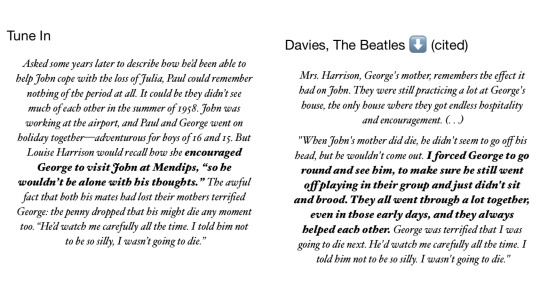
George Harrison’s mom’s made up Lewisohn rephrase which coincidentally removes Paul from the imagery.] ❦ LEWISOHN:“ Asked some years later to describe how he’d been able to help John cope with the loss of Julia, Paul could remember nothing of the period at all. It could be they didn’t see much of each other in the summer of 1958. John was working at the airport, and Paul and George went on holiday together—adventurous for boys of 16 and 15. But Louise Harrison would recall how she encouraged George to visit John at Mendips, “so he wouldn’t be alone with his thoughts.” ❦ DAVIES: “They were still practicing a lot at George’s house, the only house where they got endless hospitality and encouragement. . . . I forced George to go round and see him, to make sure he still went off playing in their group and just didn’t sit and brood. They all went through a lot together, even in those early days, and they always helped each other.”
Why do you have to slice and dice and reconstitute people’s words? No writer, and certainly no historian, should ever feel empowered to take words from a historical figure from two or three different places and topics and times, splice them together, and tell us, “Winston Churchill said this.” No he didn’t! Why are you so intent on changing the words of the people you’re writing about? What’s wrong with just using two different quotes?
You cannot take two or three quotes from two or three or even four separate statements, stick them between one set of quotation marks and say John or Paul or George or Joe Smith said this.
No they didn’t. They never said that. Why do you want me to think they did??
All these words are Abraham Lincoln’s, but this is not a Lincoln quote:
“Every man is said to have his peculiar ambition. Whether it be true or not, I can say for one that I have no other so great as that of — making a most discreditable exhibition of myself.”
(I kept it ridiculous, although I didn’t have to.)
But I want you, the reader, to be saying to yourself, “Okay, enough already. I get it!” Because in the last few days I have wandered too far into the weeds too many times and written far too many words detailing the multiplicity of ways Mr. Lewisohn does violence to each and every law of reporting historical facts, and could write many more. And I will post a more detailed list of the crimes against the quote that I am charging Mark Lewisohn with as we go forward, but I don’t think we need that now. The fact is that every fair-minded person knows what quotation marks represent, and there is no more fair-minded group of people than serious Beatles fans and scholars. And it is those fair-minded scholars who I want most to hear me. Whether you’ve written books or host a podcast or just know that you know a whole lot of stuff and take seriously your part of the trust in preserving the truth about The Beatles for us and future generations, it is you I am really talking to. My Cicero quoting-freaks. The ones who care about getting it right.
“The chief, the only, aim of style is to put facts in a clear light, with no concealment.”
- Lucian of Samosata
What footnotes can do, and what footnotes can’t.
You can list multiple sources in a single footnote. That’s not only fine, it’s correct. If I want to tell part of a story based on several sources, that often means several sources in a footnote. But not for one, single quote.
The problem isn’t the footnote, it’s the bioengineered quote on the page that you swept under a footnote hoping I wouldn’t notice.
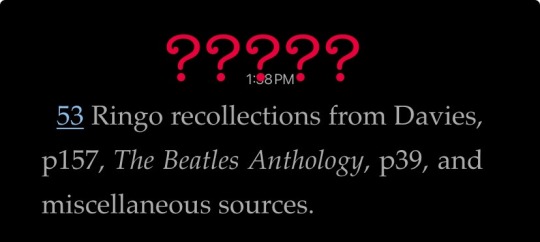
Which leads us to what a footnote is not. A footnote is not a post-hoc fixative for your textual sins. You cannot do whatever you want as long as you confess it in a footnote. A footnote is not a magic spell. A footnote is not the universally understood symbol for “I have my fingers crossed behind my back.” You cannot fix lies and misrepresentations in the footnotes. Footnotes aren’t for trying to chase down three different sources to match up which part of a manufactured “quote” someone said on which date. Footnotes are not the picture on the front of a puzzle box. I should not need to find corner pieces to figure out which of these George Harrison words were actually spoken together.
Footnotes are a truthful and independently verifiable record of primary sources. It’s that simple.
And taking Mark Lewisohn completely out of the picture for a moment, I feel sure we can all agree that neither John Lennon nor Paul McCartney nor George Harrison nor Ritchie Starkey would want anyone rearranging their words as if they were guitar chords. You wouldn’t take three-quarters of Penny Lane and one-quarter of Across the Universe, put them together and call it a Beatles‘ song. So don’t take three quarters of John to Jann Wenner and one-quarter of John to Lisa Robinson, put them together and call it a Beatle’s quote.
MY PERSONAL STANDARD IS THAT IF SOMEONE REPRESENTS, “A BEATLE SAID THIS,” IT BETTER DAMN WELL BE SOMETHING A BEATLE SAID.
None of the Beatles, dead or alive, would be cool with their words being taken out of context at all, let alone two or three different statements on god knows what being combined into one. This isn’t hard, though. Use two or three separate quotation marks, and don’t take statements out of context. Don’t mix and match their words, but don’t twist them, either. If a person said something, it is the historian’s duty to represent those words to the best of your ability, and then use them to tell a factual story focused on what you feel is important. Staying true to the original words and true to their meaning. If you can’t use those words without twisting them, then change your story to fit their words, not the other way around. If their statement helps tell the story your way, use it! For goodness sake, John Lennon said at least two opposing things about almost every topic on earth, so there should be enough to choose from without being deceptive. I actually want the truth. Don’t you?
Biography is story based around accurately represented, trustworthy and verifiable facts. And look, Beatles fans, whoever your favorite is: we are not going to get the truth about his history if we don’t learn to take these things seriously. Let’s have—if not high standards—at least the lowest generally accepted standards. In the mid-term we need a lot more Beatles scholars with a lot more points of view, and now—right now—we need experienced Beatles scholars to prioritize searching out and finding smart, interested people to mentor. And we simply must ensure that we aren’t allowing to solidify into stone “facts” that are not facts and statements no one ever made. I don’t think any honest Beatles fan—(which rounds up to all of them)—wants any question around that issue.
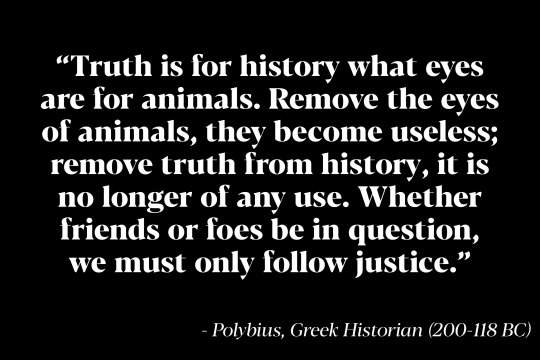
The record is the most important thing. Now, and always. This is not about John versus Paul. John versus Paul may live on always in our hearts, but for Beatles history, it’s the wrong question. I’d rather someone be up front about their loves, but in the end the focus should be on representing the primary facts in their most pristine form. Love who you love most, but place truth above all. Pristine facts. Pristine quotes. Nothing hidden. Nothing misrepresented.
Let the historical actors speak for themselves. That is their right.
And the historian’s duty.
NEXT, WE DISSECT A MONSTER.

Final note: I became frustrated and (maybe strangely) offended by Lewisohn's obscene pretenses in 2020, but my frustrations were nebulous and unfocused until this incredible AKOM series. I feel much better now. Angrier. But better. They worked their asses off. 🥂
#lewisohn#akom#the beatles#tune in#fine tuning#frankenquotes#lewisohn's monsters#historiography#paul mccartney#john lennon#george harrison#ringo starr#mark lewisohn#a beatle never said that#beatles#brian epstein#allen klein#Spotify
161 notes
·
View notes
Text
Lewisohn vs. Wenner Pt. 2 of 2
Part 1 // More Tune In analysis
You probably know the drill by now: I'm looking at the quotes from Tune In against the source Mark Lewisohn gives for them, and seeing if they're faithfully reproduced. This post deals with the multi-source Frankenquotes that are partly attributed to Jann Wenner's interviews. Five of the quotes here are from the infamous Lennon Remembers interview, with a sixth from a separate interview for Rolling Stone. Lewisohn combines John's words from these interviews with a myriad of other sources: a televised interview of John by Jean-François Vallée (1975), Hunter Davies’ The Beatles (1968), an interview/cohosting spot on The Mike Douglas Show (1972), and an interview with Lisa Robinson for Hit Parader (1975).
Before I get into it, I wanted to take a moment to discuss how I ‘grade’ Lewisohn’s quotes based on the type of source he cites. If Lewisohn is using a recorded interview, there’s some wiggle room in things like punctuation and word stress. When transcribing the same interview, two people might listen to the same phrase and come away with slightly different versions, e.g. “My favorite color was blue, but that changed after the accident in the paint factory,” vs. “My favorite color was blue. But that changed after the accident in the paint factory.” Both of those could be correct interpretations of the same recorded audio, so I can’t fault Lewisohn for changes along those lines when he’s working from an audio source.
There isn’t the same wiggle room when working from text. If I pull a quote from a book, and the book reads, “Now, I love green. It’s so lush,” I can’t change that to, “Now I love green; it’s so lush.” I’m not actually quoting the person who said those words originally—I’m quoting the transcribed and published version of what that person said.
I've taken this into account with these Frankenquotes. If there are punctuation differences between Tune In and the printed version of Lennon Remembers pictured here, I haven’t made note of them. Those same differences in a quote pulled from Davies’ The Beatles will be noted, since Lewisohn is quoting the printed source and not an original audio tape. This becomes a bit confusing when a single “quote” is compiled from different sources, and the bits from one source are graded on a different rubric than the other, but such is the thrill of fact-checking Mark Lewisohn!
Citations at the end. Time stamps refer to this upload of the Lennon Remembers interview.
Tune In 4-12 vs. Wenner p.76 (2:14:41), 18 (36:24) + Vallée Interview
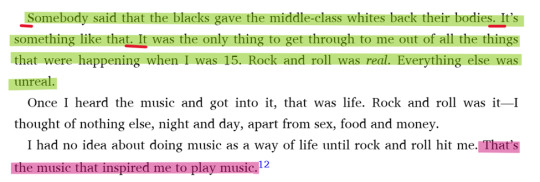


I haven't been able to track down the source for the middle section of this Frankenquote (it’s from an interview by Jean-François Vallée for the French TV Series Un jour futur, in the episode “Il était une fois: John Lennon.”), nor did I find the first sentence of the third part of the quote. It isn’t in the printed version of Lennon Remembers, and it doesn’t appear before the final sentence in the audio, though perhaps it’s elsewhere on the tape.
This has several classic Lewisohn offenses: stitching together multiple sources, combining distinct sections of a single source into one quote, and phrases omitted without ellipses. I've noted these on the images above.
What I'd like to bang on about is Lewisohn's choice not to clarify who John is referencing at the start of the quote--the "somebody" discussing black music and white bodies. In the original interview, John credits it to either "Michael X or Eldridge Cleaver" (Lennon Remembers gives this as Malcolm X, but it's clearly Michael X on the tape--see end of post for some background on Michael X and Lennon). It's common practice by many authors to clarify ambiguous references like this; Mark Lewisohn even does it in Tune In. He mostly does this in the endnotes (e.g. P-4, 2-22), but he uses a footnote to clarify a song lyric he himself uses in the prose of Chapter 4 (see footnote 4-c). Lewisohn not only fails to clarify who John is referencing here, he does not quote John's attempted attribution.
But maybe this falls under Lewisohn's inconsistent policy of not referencing the future. Still, even without naming the black activist who John references here, this quote is not a reflection of John's mindset in his adolescence: he wasn't sitting at a Quarry Bank chum's house in 1956, thinking "gee, thank goodness this black music has reconnected me with my middle-class white body!" The use of the above quote is foresight in and of itself, so why not credit the person who originated that line of thinking? Are Lewisohn's footnotes only for pronunciation guides and details of how demonstrably effeminate certain Beatles' relations were? For someone proclaiming their book a "social history", it's a bit of an oversight.
It's Eldridge Cleaver, by the way, in his prison memoir Soul on Ice (1968). It's in the chapter titled "Convalescence," in a discussion about the Beatles and white rock 'n' roll. Be forewarned if you seek it out, that section is also heavily homophobic.
Tune In 6-7 vs. Wenner p.133 (3:53:54) + Davies p.33



Hunter Davies did not record his interviews with the Beatles, as described in the introduction to the 2009 edition (p.lxiii): “I also wish now that I’d used a tape recorder. I never have done, which is silly.” Since we know Lewisohn was working with Davies’ written word, he was not at liberty to make changes like the one we see here: Davies starts a new sentence at the word “But”, which Lewisohn combines with the preceding sentence. There are changes like this throughout the quotes pulled from Davies’ work, but that’s a matter for a later post.
The other change Lewisohn makes here is more consequential. When discussing how Paul came to join the Quarrymen, John says, “That decision was to let Paul in.” Lewisohn gives the quote as “[my] decision was to let Paul in.”
Perhaps you’re thinking, “He’s used brackets! It’s fine!”, but I disagree. Brackets can be used when changing the tense of a quote, or when changing a word to clarify the meaning of a quote, so long as doing so doesn’t change the meaning. Clarification isn’t necessary here: the quote, as stated by Lennon, would make sense in the context Lewisohn provides. There’s no confusion about what decision John is discussing here.
But this change isn’t simply superfluous—it actually changes the meaning of the quote in a way that’s only clear if we look at the source. Here’s what immediately precedes the quote:
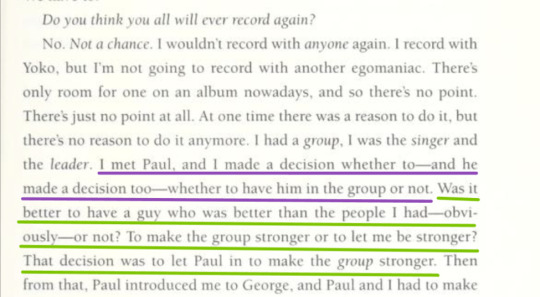
“I met Paul, and I made a decision whether to—and he made a decision too—whether to have him in the group or not.” Emphasis mine.
So John is not talking strictly about his decision, he’s talking about Paul and his mutual decision to work together. Without this context, even without the change from “that” to “my”, John seems to be discussing his own decision. Lewisohn’s change is completely unnecessary to get across his point. It’s as if he made this change specifically to push back against John Lennon’s assertion that a young Paul McCartney had autonomy and didn’t simply exist to satisfy John’s whims.
Tune In 8-4 vs. Wenner p.133-4 (3:54:42) + Davies p.44-5
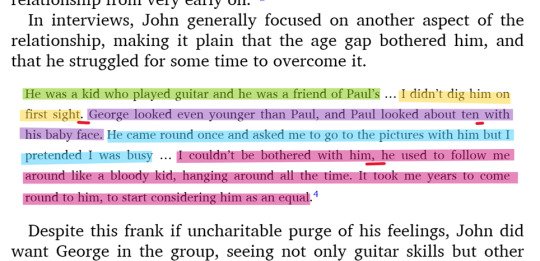

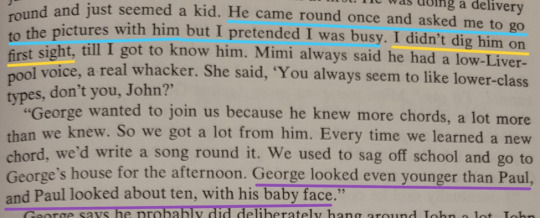
Color-coded to show the absolute chopped salad Lewisohn made of these two sources.
Also of note is Lewisohn’s follow-up to this quote, “Despite this frank if uncharitable purge of his feelings….” Lewisohn does this elsewhere (notably with John’s quote about hitting women): he follows up a self-critical quote from John with an authorial “Aw, don’t be so hard on yourself, buddy!” It’s unnecessary.
Tune In 8-28 vs. Wenner p.140 + The Mike Douglas Show


Lennon: He’s the greatest rock ‘n’ roll poet, and I really admire him.
Douglas: Do you feel the same today as you did years ago in Liverpool about rock?
Lennon: When I hear rock, good rock, of the caliber of Chuck Berry, I just fall apart and I have no other interest in life. Y’know, the world could be ending if rock ‘n’ roll’s playing, y’know. It’s a disease of mine.
I wasn’t able to find this quote in the interview audio, but I’m sure its there somewhere. I used Lennon Remembers as a guide to find the correct location of a certain segment in the 4+ hour audio, and it is apparent that certain parts of Lennon Remembers have been reordered.
I transcribed this section of the Mike Douglas Show from a video posted on the Shanghai-based streaming app BiliBili - see link in my source list.
Lewisohn uses an ellipsis to indicate a transition between two totally different sources here but does not use an ellipsis to indicate the phrases he left out of the Wenner interview. There are several small changes to the quote from the Mike Douglas show as well, but the meaning is retained.
Tune In 22-78 vs. Robinson 1975 + Wenner p.122 (1:33:20)

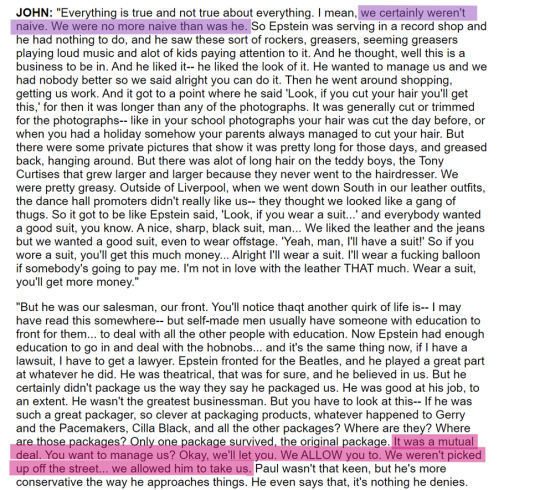

The first source here is Lisa Robinson’s 1975 interview with John for Hit Parader. You can find a version of this interview here. Note the lack of ellipsis between the purple and pink sections, despite the lengthy omission between them.
Lewisohn does use an ellipsis in the Wenner-derived portion of this quote, but he doesn’t place it correctly. The omission occurs between “and” and “Brian”, not between the rest of the quote and “and Brian.”
It wouldn’t make sense to include Allen Klein and Yoko Ono in this quote as it appears in Tune In, since they won’t appear until much later in the series, but I do wonder if presenting the quote without their names truly preserves the quote’s meaning. However you feel about them personally, Allen Klein and Yoko Ono are two of the most controversial figures in Beatles’ history. Within a few years of this interview, John would be on the outs with Allen Klein. John describes himself as someone who “make[s] a lot of mistakes character-wise”, and goes on to list three examples of his good judgments. Two of those are Allen and Yoko. Is it intellectually honest to delete those two names from the list and present Brian as the one example of John’s character judgment?
And our final Wenner Frankenquote. This one isn’t from Lennon Remembers, but from a 1970 Rolling Stone article titled “The Beatles: One Guy Standing There, Shouting ‘I’m Leaving’.”
Tune In 22-72 vs. Wenner 1970 + Robinson 1975



This one is audacious enough to warrant its own post—and we’re in luck! I defer to @mythserene's post for proper analysis. You can also find this one discussed in @anotherkindofmindpod's "Fine Tuning: Ep 7 Spanner in the Works."
In brief, in the ‘quote’ lifted from Wenner’s interview, John is using “Epstein” as a stand-in for Klein. John’s not saying “Three of us chose Epstein”—he’s saying “Three of us chose Klein, throw aside your assumptions about him for a minute.” It’s not the sort of quote you can divorce from its context if you have any credibility.
Some Context on Michael X and John Lennon:
Michael X (a.k.a. Michael Abdul Malik, born Michael de Freitas) was born in Trinidad and became a prominent member of the black Power movement in 1960s London. Lennon met Michael X early in 1970 and became a devoted supporter and advocate until Malik’s death in 1975 (Wiener 1991, p.115-123). Here’s a brief rundown of their involvement:
Since you’re the sort of person who reads citation-by-citation analyses of Beatles books, you have probably seen pictures from early 1970 of John and Yoko sporting matching pixie cuts. In January 1970, John and Yoko shaved their heads (as a publicity stunt, I assume?), and kept their shorn hair in a bag. This bag of hair was the centerpiece for their first public interaction with Michael X: in February 1970, Lennon and Ono gave Malik their bag of hair, and he gave them a pair of Muhammad Ali’s shorts. The press was very much present, but they failed to make headlines (Doggett 118). The hair was supposed to be auctioned off at Sotheby’s to support Malik’s Black House, but this fell through (see Lennon on The Dick Cavett show here.) Pictures of the event can be seen at The Beatles Bible.
Malik fled London for his native Trinidad when legal issues loomed in 1971. He started a commune there, which John visited in April of the same year. In 1972, the bodies of Joseph Skerritt and Gale Benson were found on the commune (Weiner 1991, p.118). Malik was convicted of ordering the killing of Skerritt and would be hanged for that crime in 1975 (NYT 1975 May 17).
Malik may or may not have ordered Skerritt’s murder, but regardless, he did not have a fair trial. John and Yoko campaigned from the time of his conviction up until his death for clemency, without result (Weiner 1991, p.119-123).
Sources:
Cavett D [host]. 1971 Sept 11. Interview with John Lennon and Yoko Ono. The Dick Cavett Show. Accessed online on 2024 Feb 23. Available from: https://ghostarchive.org/varchive/7kXCnKfdGOY.
Cleaver E. 1968. Soul on Ice. New York (NY): Dell Publishing Co., Inc. 210p. Accessed online. Available from: https://archive.org/details/soul-on-ice-by-eldridge-cleaver/
Davies H. 1968. 2009 Edition. The Beatles. New York (NY): W.W. Norton & Company. 408p.
Doggett P. 2009. You Never Give Me Your Money: The Beatles After the Breakup. New York (NY): HarperCollins. 390p.
Douglas M [host]. 1972 Feb 16. Season 11 Episode 123. The Mike Douglas Show with John Lennon & Yoko Ono. Accessed online 2024 Feb 23. Available from: https://b23.tv/mQMUDg9
Militant Is Hanged by Trinidad After Long Fight for Clemency. 1975 May 17. New York Times.[Internet] [cited 2024 Feb 24]. Available from: https://www.nytimes.com/1975/05/17/archives/militant-is-hanged-by-trinidad-after-long-fight-for-clemency.html
Robinson L. 1975 Dec. Interview with John Lennon. Hit Parader. Accessed Online from www.beatlesinterviews.org. Available from: https://web.archive.org/web/20230409044146/https://www.beatlesinterviews.org/db1975.1200.beatles.html
Wenner JS. 1970 May 14. The Beatles: One Guy Standing There, Shouting ‘I’m Leaving’. Rolling Stone. Accessed online. Available from: https://web.archive.org/web/20231017203039/https://www.rollingstone.com/music/music-news/the-beatles-one-guy-standing-there-shouting-im-leaving-43403/2/
Wenner JS. 1970. 1970 12 08 John Lennon Interview, Rolling STones Lennon Remembers, Complete Unedited [video]. Youtube. 2022 Apr 18, 4:26:50. Accessed 2024 Feb 18. Available from: https://www.youtube.com/watch?v=-YelhzUbrCE
Wenner JS. 1971. 2000 ed. Interview with John Lennon and Yoko Ono. Lennon Remembers. London: Verso. 151p. Accessed online. Available from: https://archive.org/details/lennonremembers00lenn_0/
Wiener J. 1984. 1991 Illini Books ed. Come Together: John Lennon In His Time. Urbana: University of Illinois Press. 379 p. Accessed online. Available from: https://archive.org/details/cometogetherjohn00jonw/
#mark lewisohn#tune in#the beatles#john lennon#jann wenner#lewi-sins#it's A LONG ONE#sorry#next post: pt 1 of my kim bennett manifesto#edit bcuz i forgot to add my sources...lewisohn moment
17 notes
·
View notes
Text
Currently cry laughing over rupaul’s drag race editors making bad frankenquotes
1 note
·
View note
Note
that quote is really strange because it’s taking things freddie said in various situations over the course of YEARS, and removing all context to make this kind of frankenquote. it feels almost intentionally confusing. i’ve seen the, “i couldn’t fall in love with a man the way i could a girl,” comment as it was originally printed, and he said that after a journalist asked him outright if he was gay. it was obvious that he didn’t want to lie, but knew he couldn’t tell the full truth, either.
I am so sorry, I forgot to answer this!
Yes, I agree with you that the massive chunk of quotes erases all the context, and clubs what Freddie said at different times, in response to different questions, in different circumstances. This is actually a common feature of the book, which is why I am a bit meh about it. The book seems like an intentional move to promote the age old 'freddie was bi, he only loved mary' narrative and twists a lot of his words.
2 notes
·
View notes
Text
Press release Frankenquotes (and how to avoid them) https://t.co/xbt8Z7Eipn by @WeAreArticulate #PR #Writing https://t.co/sEyumPrnhQ
Press release Frankenquotes (and how to avoid them) https://t.co/xbt8Z7Eipn by @WeAreArticulate #PR #Writing pic.twitter.com/sEyumPrnhQ
— workfromhome (@workfromhome776) July 17, 2018
from Twitter https://twitter.com/workfromhome776
July 17, 2018 at 02:50AM
via IFTTT
0 notes
Text
Press release Frankenquotes (and how to avoid them) https://awld.us/2jNDqei by @WeAreArticulate #PR #Writing https://awld.us/2G7CZnK
Press release Frankenquotes (and how to avoid them) https://t.co/7tm6yOxrgx by @WeAreArticulate #PR #Writing pic.twitter.com/i5ZmhIaqSq
— AnthemWild (@AnthemWild) May 11, 2018
from Twitter https://twitter.com/AnthemWild
0 notes
Photo

Press release Frankenquotes (and how to avoid them) Read: buff.ly/2vc58JK #PR #Writing #business #centralpa #harrisburg #yorkpa #hershey #gettysburg #carlislepa #lancasterpa #mechanicsburg #camphill #digitalmedia #digitalmarketing #shopsmall #smallbusinessowner
#camphill#mechanicsburg#digitalmarketing#centralpa#shopsmall#smallbusinessowner#business#harrisburg#gettysburg#lancasterpa#hershey#writing#digitalmedia#yorkpa#pr#carlislepa
0 notes
Photo
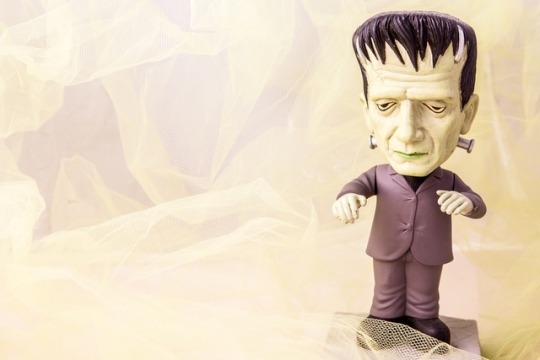
Press release Frankenquotes (and how to avoid them) Read: https://t.co/wBmDFzNAOs by @WeAreArticulate #PR #Writing https://t.co/uxqwmb7YwS
0 notes
Text
Tweeted
Press release Frankenquotes (and how to avoid them)
Read: https://t.co/Fo4ItfNgTf by @WeAreArticulate#PR #Writing pic.twitter.com/areqAxlwIt
— iwebsitez.com® (@iwebsitez) September 1, 2017
0 notes
Text
Lewisohn: rewriting history in the area where we trust him most – the songs performed
-In which Lewisohn rewrites a Beatles story and completely changes the songs sung, and coincidentally changes them in such a way so that if you know your Beatles trivia you'll think that Paul completely hogged the mic for two-thirds of the show-
Although I’ve come to a place where I’m more surprised to find a Lewisohn quote that turns out to be accurate than I am one that’s butchered, I have tended to believe that he is trustworthy on things like dates and songs performed. I’ve felt like that’s probably his anchor, and that he shapes the rest of his narrative around that.
But perhaps the habit of taking license cannot help but spread into other areas, because I am discovering that neither dates nor song lists turn out to be sacred with Mark Lewisohn.
As far as dates, that is part of a bigger piece that has been tangling me up for a few weeks, but his version of “the Beatmakers” performance shows that Mark Lewisohn will write what he wants, and that he has zero compunction in changing history to suit himself, regardless of subject.
In Chapter 22: “Right then, Brian — Manage Us,” a primary theme is that every promoter was done with the Beatles when Brian Epstein came along. Brian Kelly, especially, is given the role of being fed up with them, and Lewisohn uses “the Beatmakers” performance—Gerry and the Pacemakers and the Beatles going on stage together—as an example of how bad everything was just before Brian stepped in. (I do believe that Brian was a godsend, but that doesn’t mean that Lewisohn’s narrative is supported in every area, and in some places he stretches a lot more than in others. This is definitely one of those areas.)
Here’s the story: before going to the Litherland Town Hall performance, Bob Wooler had been drinking, maybe with the Beatles, and in Lewisohn’s version, Gerry seeing that they were all drunk sent “Gerry Marsden scuttling to the pub around the corner.” Every telling I’ve seen, one way or another, is in agreement that Gerry Marsden as well as Wooler had been drinking, and that the Pacemakers and the Beatles all played together with Wooler introducing them as “the Beatmakers.” Lewisohn adds some highly unlikely Preludin into the mix—“John, pissed and pilled…”—but I’m not going to take that on here.
Along with the chance to tell a riotously colorful story—one that in Lewisohn’s telling goes much farther than any of the source materials I’ve found—the main point of the tale is for Wooler to give us the climax of the—(all unsourced, other than this single, butchered Wooler quote)—frustration Lewisohn tells us promoter Brian Kelly was feeling: “Brian Kelly was fraught with anxiety over it. It was only a short episode and a bit of a shambles.”
The quote by Wooler that Lewisohn uses to try to prove his point, and the one and only reference he gives to support any of his “Brian Kelly fed up/Epstein must save Beatles” narrative is a modification of one of those Lewisohn monsters I call a “donut.” (There’s a hole in the middle. However in this case, as in many others, he also adds words that were never spoken.)
THE ACTUAL WOOLER QUOTE:
“Brian Kelly was fraught with anxiety over it, but the audience liked it. It was a bit of a shambles really, so I lowered the curtain on the proceedings.”
LEWISOHN’S REWRITE:
“Brian Kelly was fraught with anxiety over it. It was only a short episode and a bit of a shambles.”
And while I am very interested in what Lewisohn is using for his Brian-Epstein-saved-the-Beatles-but-Paul-tried-to-thwart-him narrative, I felt the need to pause to look at Lewisohn’s massive and nonsensical alterations to this performance, especially in the songs the improvised combo-band played. (And yet how very authoritatively Lewisohn does it.)
The whole section has problems, but let us deal with the songs.
Mark Lewisohn says they “thundered through four numbers”—
The Beatmakers thundered through four numbers—“Whole Lotta Shakin’ Goin’ On,” “What’d I Say” (extended mix), “Red Sails in the Sunset” and the new Ray Charles record “Hit the Road Jack”—during which John, pissed and pilled, slid from the piano and slumped on the stage.
—‘Tune In,’ Lewisohn – Chapter 22 (Emphasis mine.)
Sticking to the songs, the page referenced in the footnote first quotes Bob Wooler:
“They did a few numbers like ‘Hit The Road Jack’, swopping instruments and the like.”
—FOOTNOTE 9: ‘The Best of Fellas’ – Bob Wooler (Emphasis mine)
Then the next paragraph quotes Gerry Marsden, and I’m going to add boldface to the songs he says they played:
“It worked very well as we all knew the same songs and all played the same songs. Paul, John and I took turns on the piano and Les played the sax. We did ‘Roll Over Beethoven’, ‘Johnny B. Goode’, ‘Great Balls Of Fire’, ‘Pretend’, ‘Blueberry Hill’, ‘I’m Walkin'’ and ‘Sweet Little Sixteen’, probably some others too.”
—FOOTNOTE 9: ‘The Best of Fellas’ – Gerry Marsden (Emphasis mine)
So, either they performed exactly four numbers, including an “extended mix” of Paul wailing ‘What’d I Say,’ —or— they performed at least eight numbers and “probably some others, too.”
“The Best of Fellas” version from Bob Wooler and Gerry Marsden that is referenced in the footnote makes sense in ways that Lewisohn’s rewriting doesn’t. Marsden begins by saying that they all knew the same numbers, and moreover what Lewisohn is telling us is that Paul took over the mic for three out of four numbers, and went so far in his spotlight-hogging selfishness as to sing an “extended version” of ‘What’d I Say.’ It’s a particularly egregious “if you know, you know” insertion that conjures up a very damning image of Paul in this otherwise “mutual mood of cooperativeness.” But not only is Lewisohn’s song list not supported, if Paul had hogged the spotlight that way it’s only reasonable to believe that Marsden would have remembered that, and certainly wouldn’t have described the collaboration in the way he did. And if Paul was hogging the mic and spotlight and had sung song after song where he was the lead, Marsden absolutely, positively, would not have rolled off a list of songs that didn’t include a single, solitary Paul song. That is simply beyond belief.
Gerry Marsden’s recollection also makes a lot of sense in that it’s natural that he would best remember the songs where he sang lead. And indeed, out of the seven songs he names, four are Pacemakers’ songs. (Including the one Wooler names and Lewisohn decides to agree with: “Hit the Road, Jack.”) And none of the songs anyone names are songs where Paul sings lead. Two are John songs and the other is a George song, which lends credence to Gerry Marsden’s “probably some others, too” comment, because it’s likely that there was at least one song where Paul was lead.) But in Lewisohn’s seemingly fabricated four-song list, other than “Hit the Road, Jack” they’re all Paul numbers. So not only does Lewisohn choose to have Paul singing an extended version of a scene-stealing “What’d I Say” but he slyly tells us that Paul basically hogged the microphone for seventy-five percent of the numbers (and even more of the time) that this “cooperative” was on stage together. Now, if you’re not a hardcore fan with a fair amount of knowledge this will probably slip past you, but if you’ve got a dog in this hunt, and especially if you already think Paul McCartney is a self-obsessed prima donna, you’ll get the picture Lewisohn is so deliberately painting. And I write deliberately very—well, deliberately—because if a writer makes the decision to veer away from the record and create a very specific, very limited, and very fictional song list for an anecdote about two groups deciding to get together and sing, and more than two-thirds of the songs chosen for the historical rewrite are Paul songs—and then that writer even goes to the trouble of telling readers that Paul sang an “extended mix” of one of those songs—then of course it’s deliberate. Lewisohn didn’t choose his reinvented song list at random out of a Bingo cage.
Here are the songs referenced in the footnote versus the songs that Lewisohn says they sang.
SOURCE MATERIAL SONG LIST/USUAL LEAD:
“Hit the Road Jack” ✓ /Gerry Marsden
“Roll Over Beethoven”/George
“Johnny B. Goode”/John
“Great Balls Of Fire”/Gerry (and Paul?)
“Pretend”/Gerry Marsden
“Blueberry Hill”/Gerry Marsden
“Sweet Little Sixteen”/John
“I’m Walkin'”/Gerry Marsden
LEWISOHN’S SONG LIST/USUAL LEAD:
“Hit the Road Jack” ✓ /Gerry Marsden
“Whole Lotta Shakin’ Goin’ On”/Paul
“What’d I Say” (extended mix)/Paul
“Red Sails in the Sunset”/Paul
----
P.S. If you haven't been reading all of @wingsoverlagos 's work, you absolutely have to. She's done so much and Lewisohn's inventions are so much worse than I realized.

#the beatles#beatles#mark lewisohn#lewisohn is making stuff up again#dr frankenquote#lewisohn#the beatmakers#bob wooler#fine tuning#tune in#paul mccartney#john lennon#gerry and the pacemakers#the best of fellas
31 notes
·
View notes
Text
Lewisohn vs. Wenner Pt. 1 of 2

I kid, I kid! Of course I'll adjudicate things between these lads.
I'm working on the follow-up(s) to my Kim Bennett post, but I lack the degree of coherence necessary to finish them at the moment. My household has been hit with Covid and influenza, so I'm too sleep deprived to string together a proper point. But I can still check citations, baby!
Today we're tackling a fun source: Jann Wenner, co-founder of Rolling Stone magazine and early-70s confidante of the LennOnos. Mark Lewisohn quotes interviews conducted by Jann Wenner ten times in Tune In; nine of those quotes had issues. Nine of the ten quotes come from the infamous Lennon Remembers interview (conducted in Dec. 1970 and first published in Jan. 1971); the other one is from a different 1970 interview for Rolling Stone. A few of these have been covered by @mythserene; I've included links to her analysis.
About half of Lewisohn's Wenner-sourced 'quotes' are Textbook Multi-Source Frankenquotes. Lewisohn does this quite brazenly--if you look at the text of the endnote, it will say something like "First and third parts of quote from Bip Bop Weekly, second part from interview with...." The multi-source quotes will appear in part two; this post will include the single-source ones.
Pictured text is from Lennon Remembers (Verso, 2000 ed.), but I made my comparison against the audio of the interview. You can listen to it on YouTube here. I've included time stamps as well as page numbers for each quote.
Tune In 33-2 vs. Wenner p.65 (1:49:24), 145-6 (4:16:43)
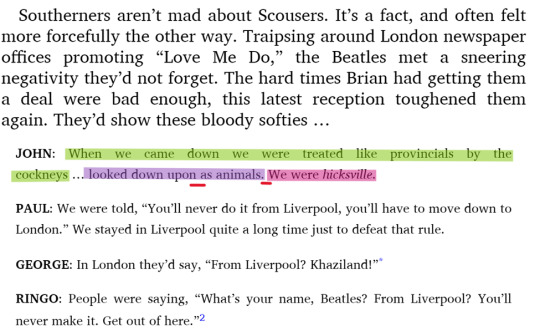


I do not like the way Lewisohn wrote/cited this--each quote from the Beatles is pulled from a different source, but it's presented almost as a dialogue. It would be simple stuff to slap an endnote after each quote giving its source, rather than using a single endnote for all four separate quotes.
That's just a quibble, but this quote delivers a big issue as well. See that ellipsis? Lewisohn is letting you know that he left out over two hours of recorded interview between the first and second parts of this quote. You can use an ellipsis to omit a few words or a sentence or two in the same passage--you can't use it to omit multiple hours of conversation.
An ellipsis would be perfectly acceptable between the fragment and the final sentence, but Lewisohn chose not to use one.
Tune In 24-33 vs. Wenner p.63 (1:44:58)

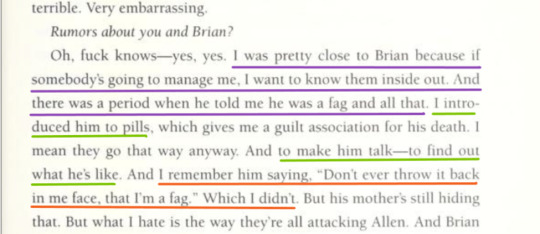
I have come to love those instances were Lewisohn throws in one token ellipsis as if that will distract from the fact that he completely scrambled the order of the sentences.
Tune In 31-44 vs. Wenner p.27 (54:46)

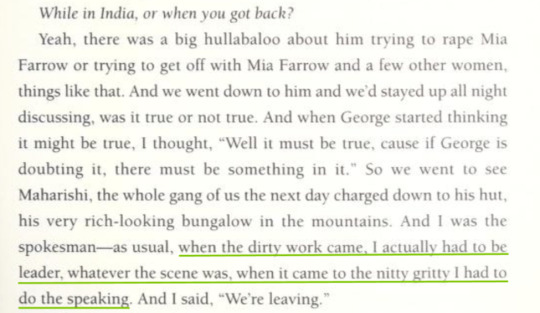
@anotherkindofmindpod discussed this in their Fine Tuning series - I believe in the episode "Leader Lennon." I won't hit it too hard.
As you can see, the context in the source text is wildly different from its use in Tune In. In the original, John is discussing confronting the Maharishi about rape allegations. In Tune In, Lewisohn uses it in the context of….discussing a song choice with George Martin. A bit different. John does imply some universality in the source quote (“as usual”), but this still seems like a stretch. Also note the omission of the word “actually” in the phrase “I actually had to be the leader,” which, to my reading, implies that John wasn’t constantly in Leader Lennon mode, unless the others were forcing him to handle the dirty work.
Sources:
Wenner JS. 1970. 1970 12 08 John Lennon Interview, Rolling STones Lennon Remembers, Complete Unedited [video]. Youtube. 2022 Apr 18, 4:26:50. Accessed 2024 Feb 18. Available from: https://www.youtube.com/watch?v=-YelhzUbrCE
Wenner JS. 1971. 2000 ed. Interview with John Lennon and Yoko Ono. Lennon Remembers. London: Verso. 151p. Accessed online. Available from: https://archive.org/details/lennonremembers00lenn_0/page/151/mode/2up
13 notes
·
View notes
Text
LEWISOHN: Let's crowdsource this bastard.
Check a footnote.

Whether you heroically tear straight into him like @wingsoverlagos or you find one thing like @delightfullyatomicfest did, it matters! What I hoped for and imagined from the beginning was some sort of crowdsourced work. There is too much for any one person, and one of the biggest problems with Beatles' sources is that they're not all equally easy to get to for everyone. And although this has become personal for me, it is an objectively huge problem for all Beatles fans and scholars that the man who has collectively been called the Beatles historian has—and I cannot say this clearly enough—BEEN JUST MAKING SHIT UP.
He literally ends ‘Tune In’ with a fabricated line that he sources to John Lennon. (!!!)
(Which I might not have realized for ages—if ever—if not for this @wingsoverlagos post)
Lewisohn has no shame.
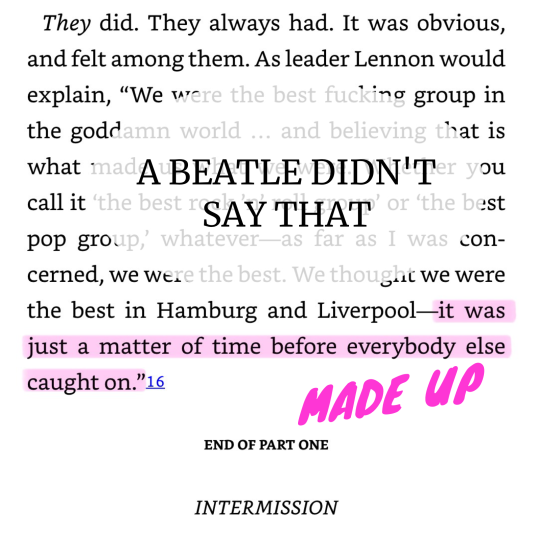
And while it may seem like we are screaming into the void right now, I will tell you that we are not. I fear jinxing anything so I won't say more now, but our work is not in vain. People are paying attention. How can they help but pay attention? It's too shocking a betrayal. Too great a breach of trust. It has become overwhelming and impossible to ignore, and it has happened so quickly. Just by a few people taking the time to do the work.
And what is obvious now is that if you take a piece of source material that's referenced and go through it you will find butchered and fabricated quotes. And whether you do it that way or just check a footnote that interests you PLEASE TELL ME what you find! 🙏🏻
I am trying to gather all this up in one place. An ammo dump, if you will. If you want credit, tell me how you want to be credited, linked to, and any combination thereof. (I don't like taking credit for things I don't find, anyway.) But either shoot me a message or @ me or all of the above so we can collect all together and it can have the cumulative effect it deserves. (I will respond, but sometimes I am gone for a few days at a time, and occasionally for up to a week. I always come back, though.) #crowdsourcelewisohn
I have also set up an email for collecting funky footnotes: [email protected] (At this point I'm only checking this once a week.)
If you look, you almost certainly will find.
If you have any Beatle magazines or Pete Best's book, "Beatle!" you could be a superhero. (One chapter of Best's book is available online, but I haven't been able to find the rest.) Or if you have any less-available source material I am urging you—begging you—to jump in and check some footnotes. With Lewisohn as bold as he is in the easily searchable things just imagine the license he's taking in the rest. But whether hard to find or commonplace, check a source. It adds up and it kind of feels good to uncover some bullshit.
For your edification and motivation I am adding a clip — lightly edited to take out some Lewisohn devolutions (so here's the queued up link) — of Mark Lewisohn bragging and basking in the praise of being called a historian who should be ranked alongside the great LBJ biographer Robert Caro, of him saying that the Beatles should appreciate anyone writing a biography of this high a standard about them, and a momentary lapse into deep resentment that they don't appreciate him. And then he gives his little speech about the Beatles being about “truth with a capital ‘T’” and how he is writing a biography to match that truth.
“Truth” is a word Mark Lewisohn needs to keep out of his mouth. If you feel like he should be struck by lightening for uttering it, that is exactly what I am talking about.
We are that lightening.
Honestly, what AKOM started is so awesome. It gave this an outlet. (And I still go back and listen for both source material and motivation.)
It's sickening to listen to this now. Sickening because Lewisohn has been making us all his dupes for far too long. We have been his marks, and there's almost nothing I hate more than being conned.

#mark lewisohn#historiography#dr frankenquote#exact words#lewisohn lies#tune in#fine tuning#wingsoverlagos#a beatle didn't say that#paul mccartney#the beatles#check a footnote#crowdsource lewisohn#AKOM#I love you Phoebe and Daphne#lewi-sins
25 notes
·
View notes
Text
Lewisohn vs. Peebles (Update/Correction)
I've been going back through my early work and found an issue with this post: in my original post, I incorrectly assumed that Lewisohn had made up the middle part of a quote. On re-examining the footnote, I found it was actually a FrankenQuote, with two sources cited in the footnote. It's still not an actual quote, but it's a lesser degree of academic dishonesty. The corrected version of the post follows:
Continuing my comparison of Mark Lewisohn’s Tune In against its sources, we come to Andy Peebles’ 1980 interview of John Lennon and Yoko Ono. The interview, conducted on December 6, 1980, was aired on the BBC Radio 1.
Lewisohn quotes this interview three times, and two of them are properly done (endnotes P-14 and 5-38). The final citation from the Peebles interview is a FrankenQuote, combining a quote from Peebles with
though, because Lewisohn thought John Lennon should go into greater detail on…Elvis’s balls.
Peebles 1981 p.73-74 vs Tune In 25-18


Yellow piece from Peebles, pink piece from interview by Jean-François Vallée (1975). I still haven't found the Vallée interview, so we will have to take Lewisohn at his word for now. I'm not sure why Lewisohn decided to combine these two quotes rather than cutting the full quote from Peebles - I guess the final FrankenQuote is more colorful?
For my previous posts on Lewisohn's citation problems, click here. Even more Lewisohn fact-checking goodness @mythserene's blog.
Source: Peebles A. 1981. The Lennon Tapes: John Lennon and Yoko Ono In Conversation With Andy Peebles, 6 December 1980. London: BBC Publications. 95p.
18 notes
·
View notes
Text
Lewisohn vs. Sheff: The Rest of 'Em (Pt. 2 of 2)
At last, the highly-anticipated (by me) conclusion to my comparison of "quotes" from Mark Lewisohn's Tune In against their source, David Sheff's 1980 Playboy interview of John Lennon and Yoko Ono. There will be more Lewi-sins after this, but Sheff will have some well-earned rest.
For discussion of alterations to citations 10-9 and 36-16, click here. For 11-31, click here. For the Rest of 'Em (pt. 1), click here. For further documentation and dissection of Lewis-sins, check out @mythserene's excellent posts on the matter.
Sheff 2000 p.132 vs Tune In 21-3


I'm highlighting this one because it is very funny that Lewisohn made up a little spiel about how much John loves Paris with the tiniest soupçon of an actual quote somewhere in the mix. Between the source and Tune In, there are three vague similarities: Paris is mentioned, holding/kissing are mentioned, and kissing under something is mentioned--the something isn't consistent between the two.
Sheff 2000 p.159 vs. Tune In 16-8


Lots of small errors here that I could chalk up to transcriptional differences, and then a big fat made up phrase that Lewisohn decided to insert at the end. Nice!
Sheff 2000 p.23 vs Tune In 16-15


Most of these phrases were said by John Lennon, but not in this order. “They became like legends” is Lewisohn’s invention; John only says they built out of proportion. It’s not the biggest change I’ve found, but look at what it does to the tone: in the original context of the quote, John is speaking (rather negatively) about how stories about the Lost Weekend were blown out of proportion, much in the way stories from the Beatles’ drunken Hamburg days were. He’s certainly not calling them legendary, but wouldn’t it be much cooler if he did???
Sheff 2000 p.168 vs Tune In 28-41


There isn’t much wrong here: highlighted in yellow, we have the quoted bit, which only differs in Tune In due to the addition of the word “track”. The reason I bring this up is because it’s a textbook Lewisohn Frankenquote: we’ve got the yellow bit, taken from the 1980 Playboy interview, and we’ve got the green bit, taken from a 1971 interview conducted by Mike Hennessey (I haven’t checked the fidelity of the quote vs. the Hennessey source as of yet). This one strikes me because it’s completely unnecessary. John says something in the Playboy interview (also highlighted in green) with the same meaning as what Lewisohn pulled out of the Hennessey interview.
Sheff 2000 p.168 vs Tune In 30-2


Again, we see Lewisohn swapping a couple of phrases around. The meaning is unchanged. Interestingly enough, in the footnote, Lewisohn mentions that a transcription error turned “pink eiderdown” into “pink eyelet” in the printed version. My printed version simply says “pink coverlet.” We’ve seen Lewisohn invent “corrections” in the form of brackets inserted into unchanged quotes (or quotes he invented) before; is it possible he found an error in the transcript and invented his own correction with “eiderdown”? I can’t say it’s outside the realm of possibility.
Sheff 2000 p.165 vs Tune In 33-18
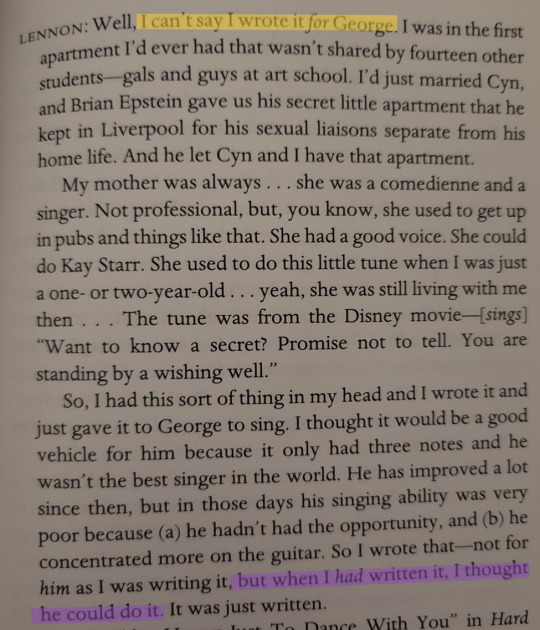

The quote here appears in the endnote itself rather than the body of the text in Tune In, and as you can see, it’s a bit mangled. Lewisohn took the first part of the sentence from the very top of the page, and after a considerable Lennon ramble, found the second part of the sentence he wanted to create. He then changed many of the words and added [George] in brackets, despite “George” being in the original sentence. Oh, Mark.
And that’s it for the 1980 Sheff interview! Next up: a brief examination of the Andy Peebles interview. Hurrah!
9 notes
·
View notes